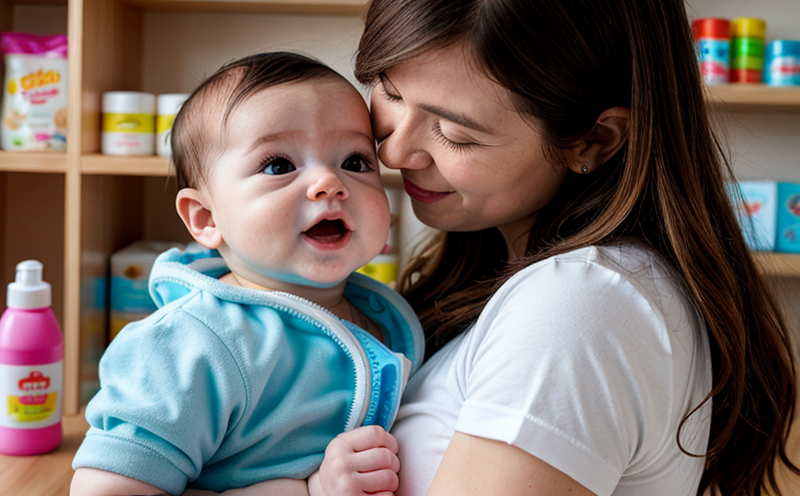FDA Compliance Testing for Baby Feeding Products
Ensuring the safety and quality of baby feeding products is paramount in today's consumer market. The Food and Drug Administration (FDA) regulates these products to ensure they are safe, effective, and properly labeled. FDA compliance testing plays a critical role in this regulatory framework by verifying that each product meets stringent standards set forth by federal regulations.
The FDA Compliance Testing for Baby Feeding Products involves a series of rigorous tests designed to evaluate the safety, nutritional content, and labeling accuracy of baby feeding products such as bottles, nipples, pacifiers, and formula. This testing is essential not only to protect consumers but also to ensure that manufacturers comply with all relevant regulations.
One of the key aspects of this service is the ability to test for potential contaminants or harmful substances that could be hazardous to infants. The FDA mandates strict limits on certain chemicals, such as Bisphenol A (BPA) and phthalates, which are not permitted in baby feeding products. Our laboratory uses state-of-the-art analytical techniques to ensure these substances do not exceed allowable levels.
In addition to chemical analysis, the testing also includes mechanical strength tests on bottle nipples to ensure they can withstand the rigors of daily use without breaking or leaking. For bottles and formula containers, we perform leak detection tests using specialized equipment that simulates real-world conditions. This ensures that consumers can trust that their baby feeding products are safe and reliable.
The FDA also requires specific labeling on baby feeding products, including nutritional information and ingredient lists. Our laboratory provides expert labeling review services to ensure all required information is accurate and in compliance with the latest regulations. We stay up-to-date with changes in FDA guidelines to provide our clients with the most current and relevant information.
The importance of this testing cannot be overstated, especially given the sensitive nature of products intended for infants. By adhering to FDA standards, manufacturers can avoid costly recalls and legal issues while maintaining a positive reputation in the marketplace. This service not only helps ensure product safety but also supports companies' compliance efforts with regulatory bodies.
The testing process typically involves multiple steps, including sample preparation, analysis using advanced instrumentation, and final reporting. Our team of experts ensures that every step is conducted meticulously to provide accurate and reliable results. The use of international standards such as ISO 3720:1985 for bottle nipple tests and ASTM D6404-12 for leak testing further enhances the credibility of our findings.
International Acceptance and Recognition
- The United States is a major market for baby feeding products, with strict FDA regulations that are widely recognized globally. Compliance with these standards is not only essential for domestic sales but also facilitates exports to other countries.
- Many international markets follow the lead of the FDA in terms of product safety and labeling requirements. This means that compliance testing conducted by our laboratory can be accepted across multiple jurisdictions, reducing the need for additional testing in different regions.
Our laboratory's certifications and accreditations further enhance its reputation as a trusted provider of FDA compliance testing services. We are accredited to ISO/IEC 17025:2017 standards, ensuring that our methods meet the highest international quality requirements. This accreditation is recognized by regulatory bodies worldwide, making our test results widely accepted in various countries.
Competitive Advantage and Market Impact
- Compliance with FDA regulations can significantly enhance a company's reputation as a leader in product safety and quality. This can be a strong selling point for brands that are committed to providing the best care possible for infants.
- Meeting regulatory requirements first can also provide a competitive edge by allowing companies to launch their products faster than those who do not comply, thus capturing market share early on.
In addition to these direct benefits, compliance testing helps mitigate risks associated with non-compliance. By avoiding potential recalls and legal actions, companies can protect their brand reputation and maintain customer trust. This is particularly important in the highly regulated infant care sector where consumers are increasingly demanding transparency and accountability.
Why It Matters
The importance of FDA compliance testing for baby feeding products cannot be overstated. The health and well-being of infants depend on the safety and quality of these products. Any breach in this safety can have severe consequences, making it imperative that manufacturers adhere to all relevant regulations.
Compliance with FDA standards is not just about avoiding penalties; it's also about building trust with consumers. Parents want to know that the products they are purchasing for their babies are safe and reliable. By ensuring compliance, companies can build a strong brand reputation and gain consumer loyalty.
The FDA Compliance Testing service we offer ensures that every product meets the highest standards of safety and quality. This testing process is comprehensive, covering all aspects from chemical analysis to mechanical strength tests. Our team of experts uses advanced instrumentation and follows international standards to provide accurate and reliable results.





